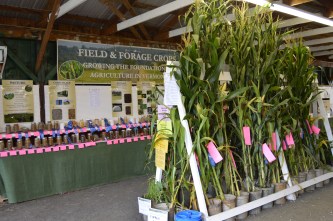Preparing for the Upcoming Season
By Nate Severy, Agronomy Outreach Professional
 This winter we have been very busy putting together workshops and meetings focused on new manure spreading rules and how farmers and custom applicators can make them work on their farms. Manure or other “agricultural wastes” cannot be spread within 25 feet of a stream and 10 feet of a ditch. There are also new restrictions when spreading in floodplains, training requirements, and recordkeeping requirements. Everyone under the certified small, medium or large farm definition must spread manure according to a Nutrient Management Plan (NMP), and all farms must apply manure based on agronomic rates.
This winter we have been very busy putting together workshops and meetings focused on new manure spreading rules and how farmers and custom applicators can make them work on their farms. Manure or other “agricultural wastes” cannot be spread within 25 feet of a stream and 10 feet of a ditch. There are also new restrictions when spreading in floodplains, training requirements, and recordkeeping requirements. Everyone under the certified small, medium or large farm definition must spread manure according to a Nutrient Management Plan (NMP), and all farms must apply manure based on agronomic rates.
We received a grant last fall from the Vt. Agency of Agriculture, Food and Markets (VAAFM) to develop an educational and certification program for custom manure applicators in coordination with the Northwest Crop and Soil Team. This program will be very similar to the Pesticide Applicator Program: applicators will have to take and pass an exam, recertify yearly, and accumulate 8 hours of professional development over 5 years to maintain the certification. The first exam will take place next winter, most likely before Christmas.
For this upcoming cropping season, even though custom applicators will not have their applicator certification, these businesses will be expected to follow all of the RAPs pertaining to spreading manure, including keeping application records. To help everyone learn about the RAPs and what records need to be kept, we helped organize 3 custom manure applicator workshops and 5 farmer and custom applicator employee workshops throughout Vermont. At these events, attendees learned about the new rules and what is expected from them. These workshops also provided a forum where people were able to ask questions and engage in open dialogue with VAAFM staff. At each meeting there were good conversations that generated important questions and it is great to hear respectful conversations. Even when people do not agree they can still have a good discussion. We are here to help applicators sort out their questions about the RAPs and will continue to keep the dialogue going.
Going into the 2017 cropping season, I believe that recordkeeping is going be a big obstacle for many people. Good recordkeeping takes extra time, patience, and dedication, even on a small farm. If someone is not prepared, recordkeeping could be challenging for a custom applicator that spreads manure on thousands or even tens of thousands of acres on many different farms. At our meetings, we stressed that the key to good recordkeeping is to seamlessly integrate it into your business. Some are already doing this through technologies like UVM’s goCrop™ or flow meters where fieldby-field data is automatically recorded and downloaded into a computer. Other people have put recordkeeping logs on the back of employee timesheets and require that the employee fill out the log in order to be paid. For custom applicators who need help with recordkeeping, UVM Extension has developed a recordkeeping book (copies available at our office). Each page has a carbon copy so at the end of the day the applicator can fill out the page, tear off the top and give it to the farmer for his/her records, and then tear off the carbon copy and put it in a file at home. All of these systems are acceptable, but it is important to use the system that will work best for you, and will help strengthen your business going into the future. Even though there is an initial inertia required to make record keeping successful, the hope is that it can also pay off for the farmer by documenting and improving on agronomic practices.
If you have questions about manure application or would like more information or materials on record keeping, contact our office. If you do not have an NMP and need to obtain one, contact your local conservation district or NRCS office for funding possibilities.
 , 8 a.m.-noon – Drop off crop entries to participate in our FIELD CROP EXHIBIT. Addison County Fair and Field Days August 8-12: We are looking forward to your entries. This is one way we connect with the public, describe the importance of agriculture, and how farming has changed over the years. From corn and hay to wheat and soybeans, help us show and tell everybody about the great crops you grow – then use your prize winnings on fair treats for the family!
, 8 a.m.-noon – Drop off crop entries to participate in our FIELD CROP EXHIBIT. Addison County Fair and Field Days August 8-12: We are looking forward to your entries. This is one way we connect with the public, describe the importance of agriculture, and how farming has changed over the years. From corn and hay to wheat and soybeans, help us show and tell everybody about the great crops you grow – then use your prize winnings on fair treats for the family!




